|
|
|
Sort Order |
|
|
|
Items / Page
|
|
|
|
|
|
|
| Srl | Item |
| 1 |
ID:
084428
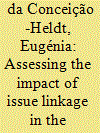

|
|
|
|
|
| Publication |
2008.
|
| Summary/Abstract |
Although issue linkage is often an important variable in negotiations, it remains an underdeveloped research area in European integration studies. This article attempts to assess the impact of issue linkage on EU bargaining outcomes by applying the Tollison and Willett spatial model of issue linkage to a key bargaining situation in the common fisheries policy: the negotiations on the introduction of the common market organization and structural policy. This article attempts to demonstrate how deals can be completed through issue linkage packages and to identify the conditions that make issue linkage more likely.
|
|
|
|
|
|
|
|
|
|
|
|
|
|
|
|
| 2 |
ID:
124137
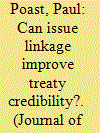

|
|
|
|
|
| Publication |
2013.
|
| Summary/Abstract |
Can issue linkage, the combining of multiple issues into a single agreement, enhance the credibility of an agreement? I use the alliance relations of buffer states (states located between two recently or currently warring rivals) to test the claim that issue linkage enhances compliance with treaty obligations. The alliance relations of buffer states create a "hard case" for treaty compliance because, by being prone to invasion and occupation, buffer states have difficulties inducing states to remain committed to an alliance agreement. Hence, if linkage provisions can enhance the credibility of alliance commitments for buffer states, then linkage provisions should improve treaty compliance in nearly any context. I find that buffer states in alliances with trade provisions experience fewer opportunistic violations of the alliance terms, avoid occupation and invasion at a higher rate, and experience fewer third-party attacks than buffer states in other alliance arrangements.
|
|
|
|
|
|
|
|
|
|
|
|
|
|
|
|
| 3 |
ID:
182672
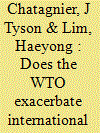

|
|
|
|
|
| Summary/Abstract |
As one component of its mission to reduce trade barriers and encourage the liberalization of international commerce, the World Trade Organization provides states with a forum in which they can raise and resolve complaints about partners’ unfair trading practices. This mechanism streamlines the process of identifying non-compliant behavior, and provides real incentives for the removal of such policies. By furnishing a form of dispute resolution, the institution should be both trade-inducing and peace-enhancing for member states. However, this very mechanism also has the potential to aggravate existing dispute for two reasons. First, it removes the opportunity for states to use economic policies as instruments of structural linkage in resolving disputes. Second, it deprives its members of powerful economic tools that could be used in lieu of militarized responses. Using the implementation of the WTO Dispute Settlement mechanism, as well as the subsequent expiration of Article 13 of the WTO Agreement on Agriculture (the so-called ‘peace clause’), we examine whether the opportunity to resolve trade disputes through the organization affects the likelihood that member states engage in militarized conflict with one another. We find that membership in a trade institution facilitates peaceful interaction, but that judicialization erases these benefits. We conclude that institution building requires caution and attention to the possibility of unintended consequences.
|
|
|
|
|
|
|
|
|
|
|
|
|
|
|
|
| 4 |
ID:
077671
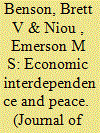

|
|
|
|
|
| Publication |
2007.
|
| Summary/Abstract |
Most of the contemporary policy debate regarding economic interdependence and peace has focused on devising responses either in favor of or in opposition to the prevailing notion that trade is positively and unconditionally correlated with peace. The China and Taiwan case-noteworthy for the simultaneous presence of an ever-increasing economic interdependence and an adversarial political relationship-provides an interesting counter-example to the leading positions in the literature. What is missing in the literature is a model that studies states' decisions to trade and initiate conflict as a function not only of their own utility but also of their perceptions about how their opponent will respond. States' decisions to trade depend on the likelihood that their prospective trade partner will initiate a conflict, and decisions to initiate a conflict depend on perceptions of the likelihood that the target will concede. In this article, the authors develop a model that expands the domain of the trade-peace analysis by endogenizing and analyzing states' decisions to trade and initiate conflicts
|
|
|
|
|
|
|
|
|
|
|
|
|
|
|
|
| 5 |
ID:
154796
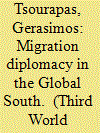

|
|
|
|
|
| Summary/Abstract |
Despite a recent resurgence in research on the politics of migration, foreign policy analysts have yet to approach cross-border population mobility as a distinct field of inquiry. Particularly within the Global South, scant work has theorised the interplay between migration and interstate bargaining. This article proposes the framework of migration diplomacy to examine how mobility features in states’ issue-linkage strategies, in both cooperative and coercive contexts. Drawing on Arabic, French and English primary sources, it empirically demonstrates the salience of its framework through an analysis of Libya’s migration diplomacy towards its Arab, African and European neighbours under Muammar Gaddafi.
|
|
|
|
|
|
|
|
|
|
|
|
|
|
|
|
| 6 |
ID:
081548
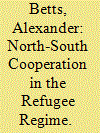

|
|
|
|
|
| Publication |
2008.
|
| Summary/Abstract |
This article explores the role of issue linkage in North-South relations in the global refugee regime between 1980 and 2005. It argues that North-South cooperation has been crucial for overcoming collective action failure in the regime. However, it suggests that because of the absence of a binding normative framework or overriding interest impelling Northern states to support refugee protection in the South, the prospects for overcoming North-South impasse have depended upon the ability of states and the Office of the United Nations High Commissioner for Refugees (UNHCR) to use issue linkage to connect the "refugee issue" to states' wider interests in other issue areas of global governance-notably migration, security, development, and peacebuilding. The article makes this argument by examining the four principal case studies of UNHCR-led attempts to facilitate North-South cooperation in order to address mass influx or protracted refugee situations in specific regional contexts: the International Conferences on Assistance to Refugees in Africa of 1981 and 1984; the International Conference on Central American Refugees of 1987-1994; the Comprehensive Plan of Action for Indochinese Refugees of 1988-1996; and the Convention Plus initiative of 2003-2005.
|
|
|
|
|
|
|
|
|
|
|
|
|
|
|
|
| 7 |
ID:
165886


|
|
|
|
|
| Summary/Abstract |
A growing number of developed country governments link good governance, including human rights, to developing countries’ access to aid, trade, and investment. We consider whether governments enforce these conditions sincerely, in response to rights violations, or whether such conditions might instead be used as a veil for protectionist policies, motivated by domestic concerns about import competition. We do so via an examination of the world’s most important unilateral trade preference program, the US Generalized System of Preferences (GSP), which includes worker rights as one criterion for program access. We argue that the two-tiered structure of the GSP privileges some domestic interests at one level, while disadvantaging them at the other. Using a new data set on all US GSP beneficiary countries and sanctioning measures from 1986 to 2013, we demonstrate that labor rights outcomes play a role in the maintenance of country-level trade benefits and that import competition does not condition the application of rights-based criteria at this level. At the same, however, the US government does not consider worker rights in the elements (at the country-product level) of the program that have the greatest material impact. The result is a situation in which the US government talks somewhat sincerely at the country level in its rights-based conditionality, but its behavior at the country-product level cheapens this talk.
|
|
|
|
|
|
|
|
|
|
|
|
|
|
|
|
|
|
|
|
|